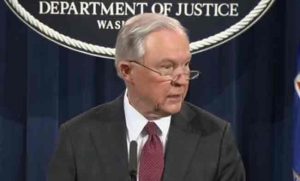
WHITE HOUSE — U.S. Attorney General Jeff Sessions has recused himself from any federal investigation of alleged Russian meddling in the 2016 presidential election.
Sessions met with reporters Thursday after The Washington Post reported that as a U.S. senator and member of the Trump campaign, Sessions held two pre-election meetings with Russian Ambassador Sergey Kislyak but withheld that information during his confirmation hearing.
Questions have hovered whether Sessions talked about the campaign with the ambassador. Some lawmakers from both parties demanded Sessions recuse himself, while some Democrats said he should resign, accusing him of lying under oath.
Trump backs Sessions
President Donald Trump, who earlier said he does not think Sessions should recuse himself, called his attorney general “an honest man” who could have stated his response at the hearing more accurately.
“The Democrats are overplaying their hand. They lost the election and now they have lost their grip on reality. … It is a total witch hunt,” the president’s statement said.
At Sessions’ January 10 confirmation hearing, Democratic Senator Al Franken asked Sessions what he would do if there were any evidence that anyone in the Trump campaign communicated with the Russian government.
“I’m not aware of any of those activities. I have been called a surrogate a time or two in that campaign, and I didn’t have, did not have, communications with the Russians, and I’m unable to comment on it,” Sessions replied.
He told reporters Thursday that he never had any intention to mislead anyone and that his answers were “honest and correct” as he understood the question at that time.
But he said that “in retrospect, I should have slowed down and said, ‘But I did meet one Russian official a couple of times. That would be the ambassador.'”Sessions said Thursday his meetings with Kislyak — first at the Republican National Convention in July, then in his Capitol Hill office in September — were part of his job as a member of the Senate Armed Services Committee and that “so many” other ambassadors also wanted a meeting.
Sessions said he and Kislyak talked about terrorism and Ukraine, describing the meeting as “testy” at one point when the matter of Russian involvement in Ukraine came up.
Reasoning behind recusal
Sessions said Thursday that he decided to recuse himself in any investigation into alleged Russian interference in the election upon the recommendation of his staff at the Justice Department. He said no one should see his decision as confirmation that any probe is currently under way. The attorney general is the top law enforcement officer in the United States.[xyz-ihs snippet=”adsense-body-ad”]
The White House and Republicans accused Democrats of playing politics with the issue.
Trump’s son-in-law also met Russian Ambassador
Meanwhile, the White House confirmed to The New York Times on Thursday that Trump’s son-in-law, Jared Kushner, had met with Kislyak and incoming (now former) national security adviser Michael Flynn at Trump Tower in New York in December.
White House spokeswoman Hope Hicks said the purpose of the meeting was to “establish a line of communication.” She said Kushner had also met with representatives of as many as two dozen other countries, which is common with an incoming administration.
The USA Today newspaper also reported Thursday that two Trump campaign national security experts met with Kislyak at the Republican convention in Cleveland.
There is nothing untoward about foreign governments meeting with members of an incoming U.S. administration.
Repeated denials about Russian contacts
But for months, the Trump administration denied that there had been any contacts between anyone in the campaign and Russian officials — and of all the countries whose representatives met with Trump officials, only Russia is accused of hacking into Democratic Party emails in an effort to help Trump beat Hillary Clinton in the November election.
Trump fired Flynn after just 24 days on the job after information emerged that Flynn had lied to top officials about the nature of his own conversations with the Russian ambassador.
FBI, Senate Intelligence investigations
The Federal Bureau of Investigation, which is part of the Justice Department that Sessions heads, is probing alleged Russian activities aimed at disrupting the U.S. election and any possible links between the Trump campaign and the government of Russian President Vladimir Putin.
The Senate Intelligence Committee is carrying out its own probe, and the House Intelligence Committee announced guidelines for its investigation on Wednesday.
Source:VOA
